400241 Supporting Aged Communities: Analysis of Aged Care Services
VerifiedAdded on 2023/06/04
|15
|4876
|134
Essay
AI Summary
This essay provides a comprehensive analysis of supporting aged communities, focusing on the healthy ageing model and the evolution of aged care services. It explores the principles of the WHO ageing model, emphasizing the importance of ethical considerations, service programs, and lifestyle choices for the elderly. The essay also discusses how aged care services in Australia are organized and provided by government agencies, non-governmental organizations, and community initiatives, highlighting the crucial role of carers. Furthermore, it examines the changes in health services for the aged over time and suggests ways to improve the health and well-being of older adults. Desklib offers this essay as a valuable resource for students studying healthcare and community support.
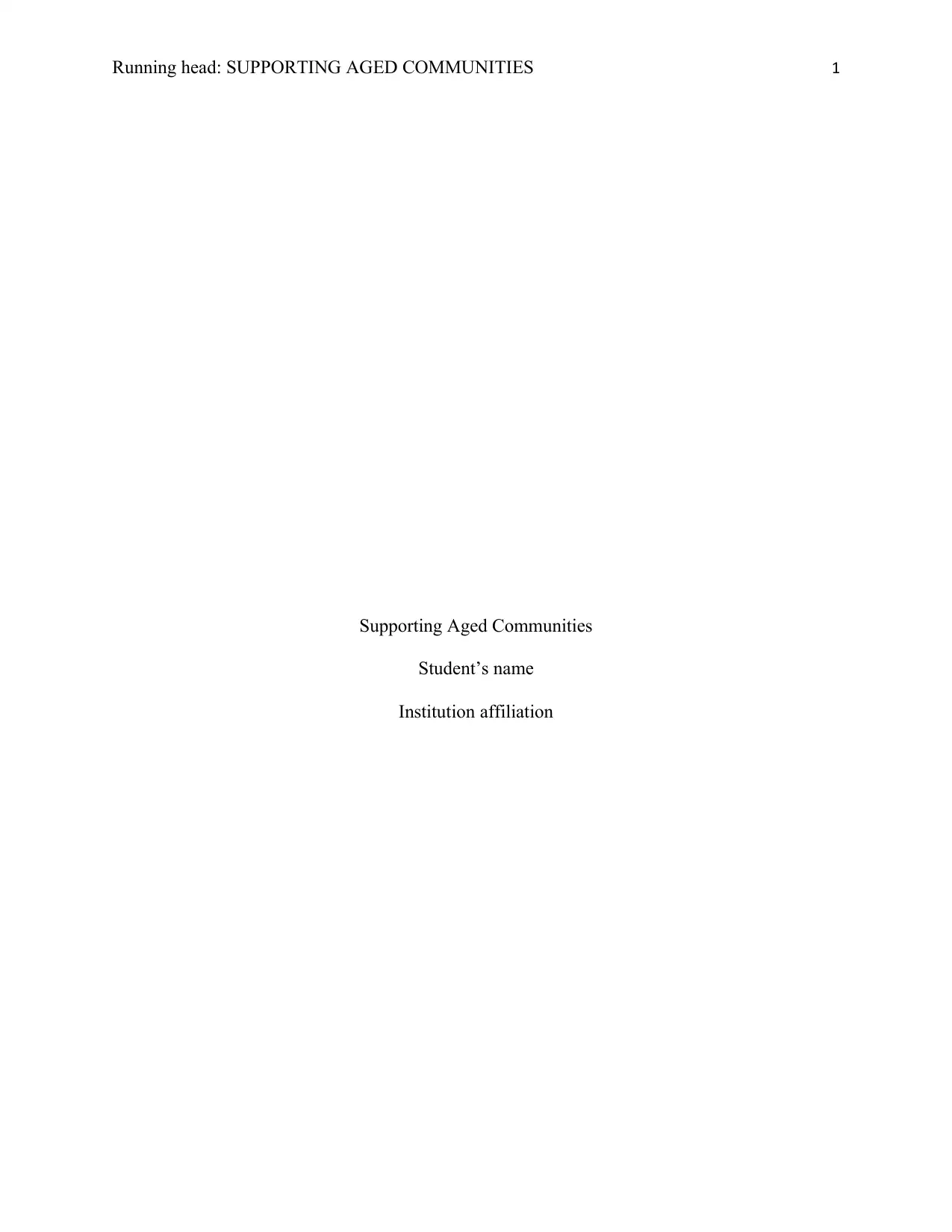
Running head: SUPPORTING AGED COMMUNITIES 1
Supporting Aged Communities
Student’s name
Institution affiliation
Supporting Aged Communities
Student’s name
Institution affiliation
Paraphrase This Document
Need a fresh take? Get an instant paraphrase of this document with our AI Paraphraser
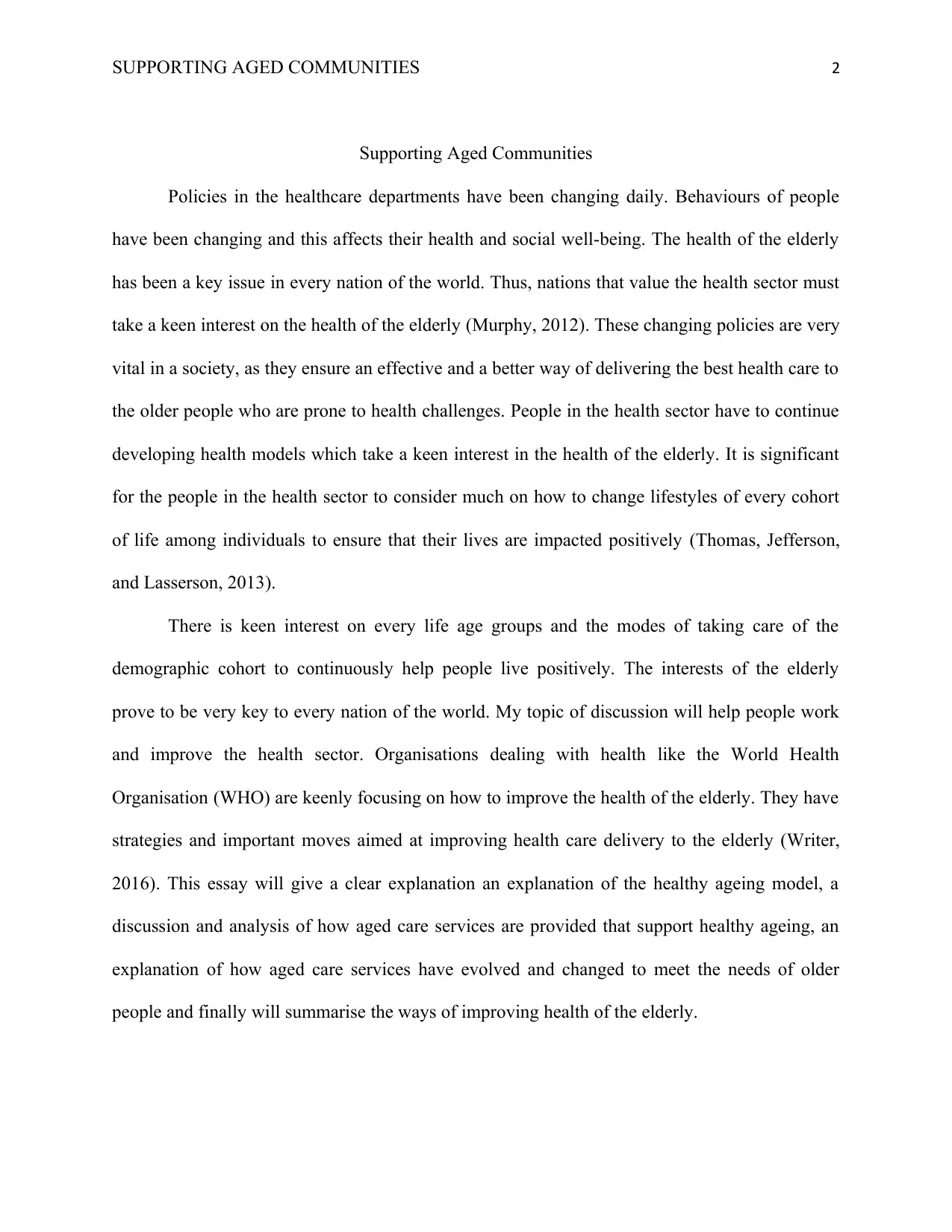
SUPPORTING AGED COMMUNITIES 2
Supporting Aged Communities
Policies in the healthcare departments have been changing daily. Behaviours of people
have been changing and this affects their health and social well-being. The health of the elderly
has been a key issue in every nation of the world. Thus, nations that value the health sector must
take a keen interest on the health of the elderly (Murphy, 2012). These changing policies are very
vital in a society, as they ensure an effective and a better way of delivering the best health care to
the older people who are prone to health challenges. People in the health sector have to continue
developing health models which take a keen interest in the health of the elderly. It is significant
for the people in the health sector to consider much on how to change lifestyles of every cohort
of life among individuals to ensure that their lives are impacted positively (Thomas, Jefferson,
and Lasserson, 2013).
There is keen interest on every life age groups and the modes of taking care of the
demographic cohort to continuously help people live positively. The interests of the elderly
prove to be very key to every nation of the world. My topic of discussion will help people work
and improve the health sector. Organisations dealing with health like the World Health
Organisation (WHO) are keenly focusing on how to improve the health of the elderly. They have
strategies and important moves aimed at improving health care delivery to the elderly (Writer,
2016). This essay will give a clear explanation an explanation of the healthy ageing model, a
discussion and analysis of how aged care services are provided that support healthy ageing, an
explanation of how aged care services have evolved and changed to meet the needs of older
people and finally will summarise the ways of improving health of the elderly.
Supporting Aged Communities
Policies in the healthcare departments have been changing daily. Behaviours of people
have been changing and this affects their health and social well-being. The health of the elderly
has been a key issue in every nation of the world. Thus, nations that value the health sector must
take a keen interest on the health of the elderly (Murphy, 2012). These changing policies are very
vital in a society, as they ensure an effective and a better way of delivering the best health care to
the older people who are prone to health challenges. People in the health sector have to continue
developing health models which take a keen interest in the health of the elderly. It is significant
for the people in the health sector to consider much on how to change lifestyles of every cohort
of life among individuals to ensure that their lives are impacted positively (Thomas, Jefferson,
and Lasserson, 2013).
There is keen interest on every life age groups and the modes of taking care of the
demographic cohort to continuously help people live positively. The interests of the elderly
prove to be very key to every nation of the world. My topic of discussion will help people work
and improve the health sector. Organisations dealing with health like the World Health
Organisation (WHO) are keenly focusing on how to improve the health of the elderly. They have
strategies and important moves aimed at improving health care delivery to the elderly (Writer,
2016). This essay will give a clear explanation an explanation of the healthy ageing model, a
discussion and analysis of how aged care services are provided that support healthy ageing, an
explanation of how aged care services have evolved and changed to meet the needs of older
people and finally will summarise the ways of improving health of the elderly.
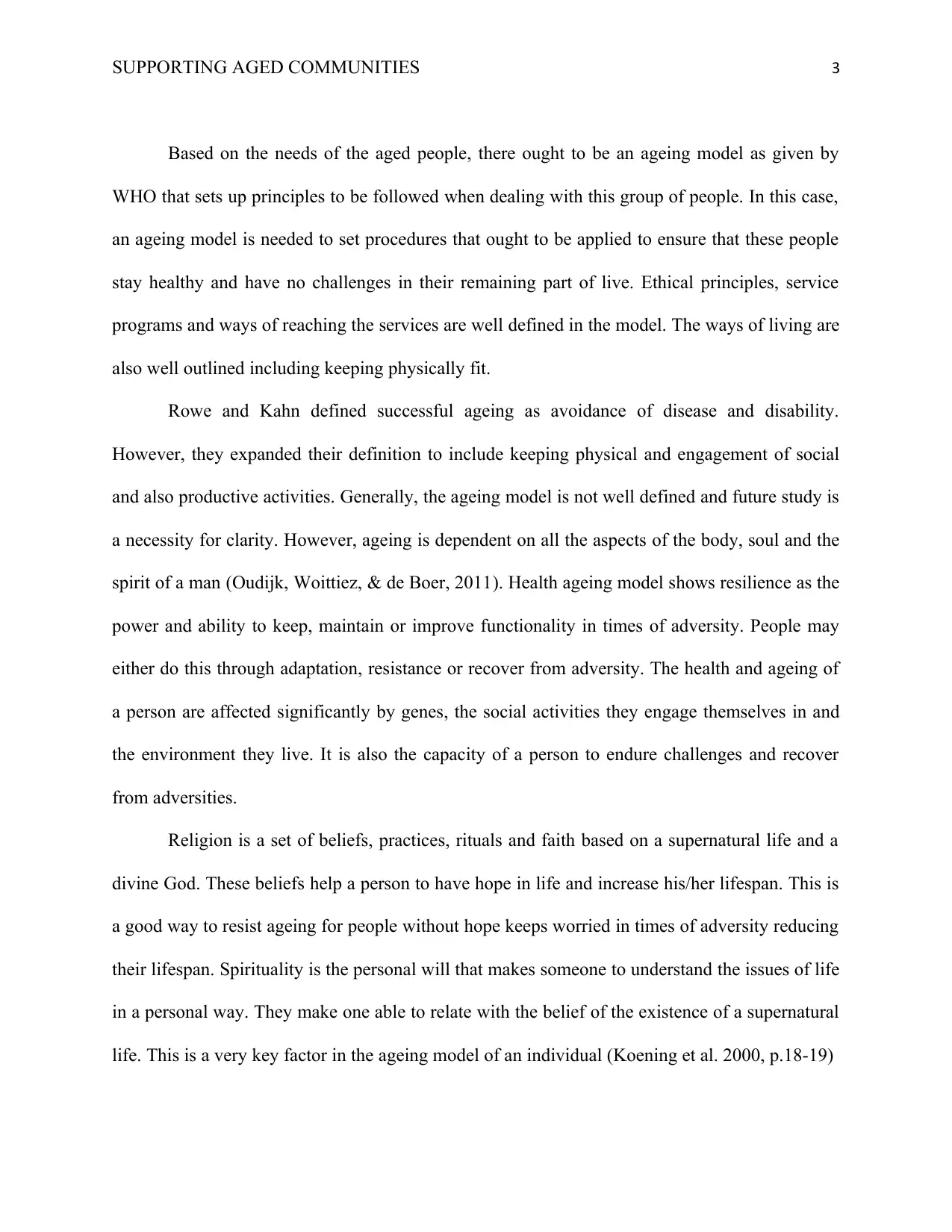
SUPPORTING AGED COMMUNITIES 3
Based on the needs of the aged people, there ought to be an ageing model as given by
WHO that sets up principles to be followed when dealing with this group of people. In this case,
an ageing model is needed to set procedures that ought to be applied to ensure that these people
stay healthy and have no challenges in their remaining part of live. Ethical principles, service
programs and ways of reaching the services are well defined in the model. The ways of living are
also well outlined including keeping physically fit.
Rowe and Kahn defined successful ageing as avoidance of disease and disability.
However, they expanded their definition to include keeping physical and engagement of social
and also productive activities. Generally, the ageing model is not well defined and future study is
a necessity for clarity. However, ageing is dependent on all the aspects of the body, soul and the
spirit of a man (Oudijk, Woittiez, & de Boer, 2011). Health ageing model shows resilience as the
power and ability to keep, maintain or improve functionality in times of adversity. People may
either do this through adaptation, resistance or recover from adversity. The health and ageing of
a person are affected significantly by genes, the social activities they engage themselves in and
the environment they live. It is also the capacity of a person to endure challenges and recover
from adversities.
Religion is a set of beliefs, practices, rituals and faith based on a supernatural life and a
divine God. These beliefs help a person to have hope in life and increase his/her lifespan. This is
a good way to resist ageing for people without hope keeps worried in times of adversity reducing
their lifespan. Spirituality is the personal will that makes someone to understand the issues of life
in a personal way. They make one able to relate with the belief of the existence of a supernatural
life. This is a very key factor in the ageing model of an individual (Koening et al. 2000, p.18-19)
Based on the needs of the aged people, there ought to be an ageing model as given by
WHO that sets up principles to be followed when dealing with this group of people. In this case,
an ageing model is needed to set procedures that ought to be applied to ensure that these people
stay healthy and have no challenges in their remaining part of live. Ethical principles, service
programs and ways of reaching the services are well defined in the model. The ways of living are
also well outlined including keeping physically fit.
Rowe and Kahn defined successful ageing as avoidance of disease and disability.
However, they expanded their definition to include keeping physical and engagement of social
and also productive activities. Generally, the ageing model is not well defined and future study is
a necessity for clarity. However, ageing is dependent on all the aspects of the body, soul and the
spirit of a man (Oudijk, Woittiez, & de Boer, 2011). Health ageing model shows resilience as the
power and ability to keep, maintain or improve functionality in times of adversity. People may
either do this through adaptation, resistance or recover from adversity. The health and ageing of
a person are affected significantly by genes, the social activities they engage themselves in and
the environment they live. It is also the capacity of a person to endure challenges and recover
from adversities.
Religion is a set of beliefs, practices, rituals and faith based on a supernatural life and a
divine God. These beliefs help a person to have hope in life and increase his/her lifespan. This is
a good way to resist ageing for people without hope keeps worried in times of adversity reducing
their lifespan. Spirituality is the personal will that makes someone to understand the issues of life
in a personal way. They make one able to relate with the belief of the existence of a supernatural
life. This is a very key factor in the ageing model of an individual (Koening et al. 2000, p.18-19)
⊘ This is a preview!⊘
Do you want full access?
Subscribe today to unlock all pages.

Trusted by 1+ million students worldwide
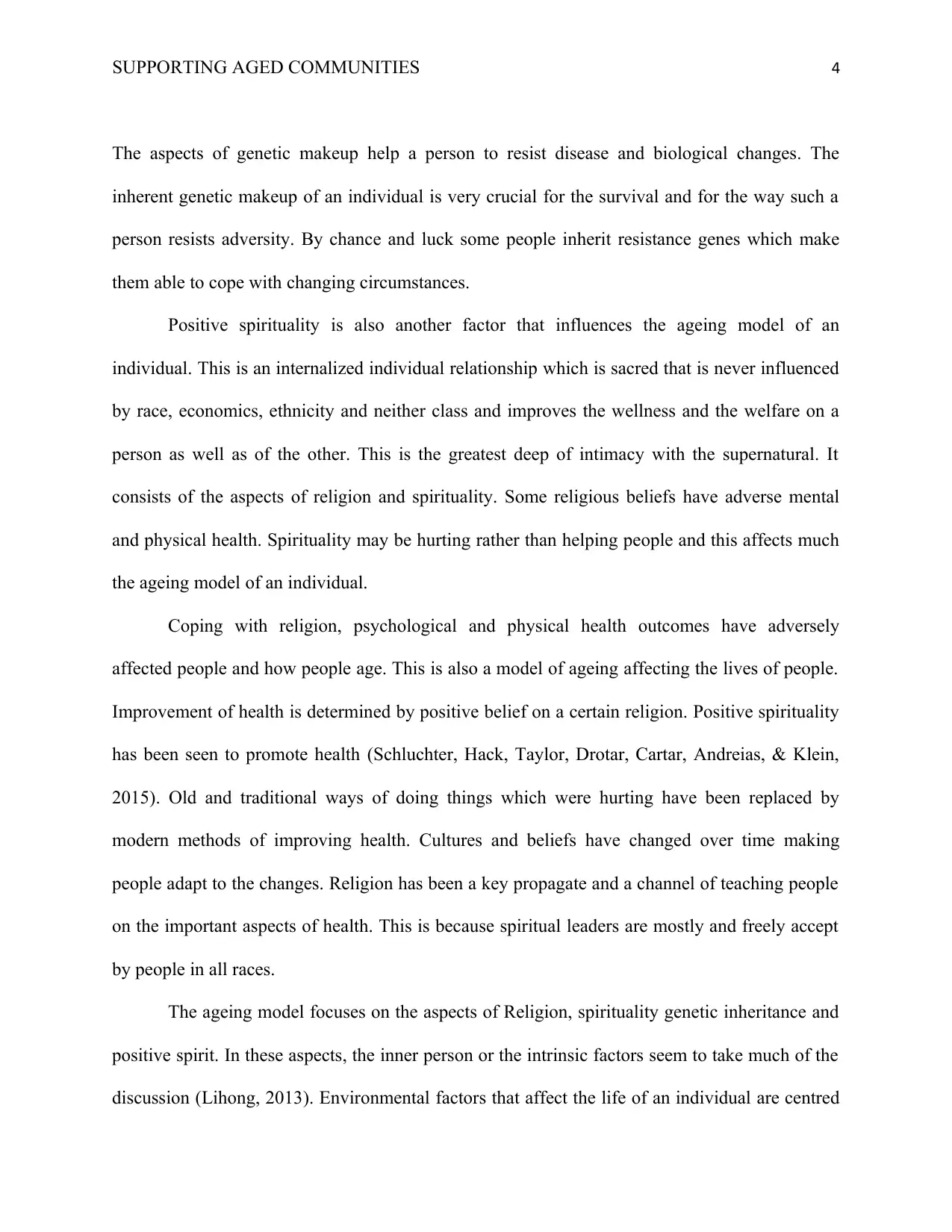
SUPPORTING AGED COMMUNITIES 4
The aspects of genetic makeup help a person to resist disease and biological changes. The
inherent genetic makeup of an individual is very crucial for the survival and for the way such a
person resists adversity. By chance and luck some people inherit resistance genes which make
them able to cope with changing circumstances.
Positive spirituality is also another factor that influences the ageing model of an
individual. This is an internalized individual relationship which is sacred that is never influenced
by race, economics, ethnicity and neither class and improves the wellness and the welfare on a
person as well as of the other. This is the greatest deep of intimacy with the supernatural. It
consists of the aspects of religion and spirituality. Some religious beliefs have adverse mental
and physical health. Spirituality may be hurting rather than helping people and this affects much
the ageing model of an individual.
Coping with religion, psychological and physical health outcomes have adversely
affected people and how people age. This is also a model of ageing affecting the lives of people.
Improvement of health is determined by positive belief on a certain religion. Positive spirituality
has been seen to promote health (Schluchter, Hack, Taylor, Drotar, Cartar, Andreias, & Klein,
2015). Old and traditional ways of doing things which were hurting have been replaced by
modern methods of improving health. Cultures and beliefs have changed over time making
people adapt to the changes. Religion has been a key propagate and a channel of teaching people
on the important aspects of health. This is because spiritual leaders are mostly and freely accept
by people in all races.
The ageing model focuses on the aspects of Religion, spirituality genetic inheritance and
positive spirit. In these aspects, the inner person or the intrinsic factors seem to take much of the
discussion (Lihong, 2013). Environmental factors that affect the life of an individual are centred
The aspects of genetic makeup help a person to resist disease and biological changes. The
inherent genetic makeup of an individual is very crucial for the survival and for the way such a
person resists adversity. By chance and luck some people inherit resistance genes which make
them able to cope with changing circumstances.
Positive spirituality is also another factor that influences the ageing model of an
individual. This is an internalized individual relationship which is sacred that is never influenced
by race, economics, ethnicity and neither class and improves the wellness and the welfare on a
person as well as of the other. This is the greatest deep of intimacy with the supernatural. It
consists of the aspects of religion and spirituality. Some religious beliefs have adverse mental
and physical health. Spirituality may be hurting rather than helping people and this affects much
the ageing model of an individual.
Coping with religion, psychological and physical health outcomes have adversely
affected people and how people age. This is also a model of ageing affecting the lives of people.
Improvement of health is determined by positive belief on a certain religion. Positive spirituality
has been seen to promote health (Schluchter, Hack, Taylor, Drotar, Cartar, Andreias, & Klein,
2015). Old and traditional ways of doing things which were hurting have been replaced by
modern methods of improving health. Cultures and beliefs have changed over time making
people adapt to the changes. Religion has been a key propagate and a channel of teaching people
on the important aspects of health. This is because spiritual leaders are mostly and freely accept
by people in all races.
The ageing model focuses on the aspects of Religion, spirituality genetic inheritance and
positive spirit. In these aspects, the inner person or the intrinsic factors seem to take much of the
discussion (Lihong, 2013). Environmental factors that affect the life of an individual are centred
Paraphrase This Document
Need a fresh take? Get an instant paraphrase of this document with our AI Paraphraser
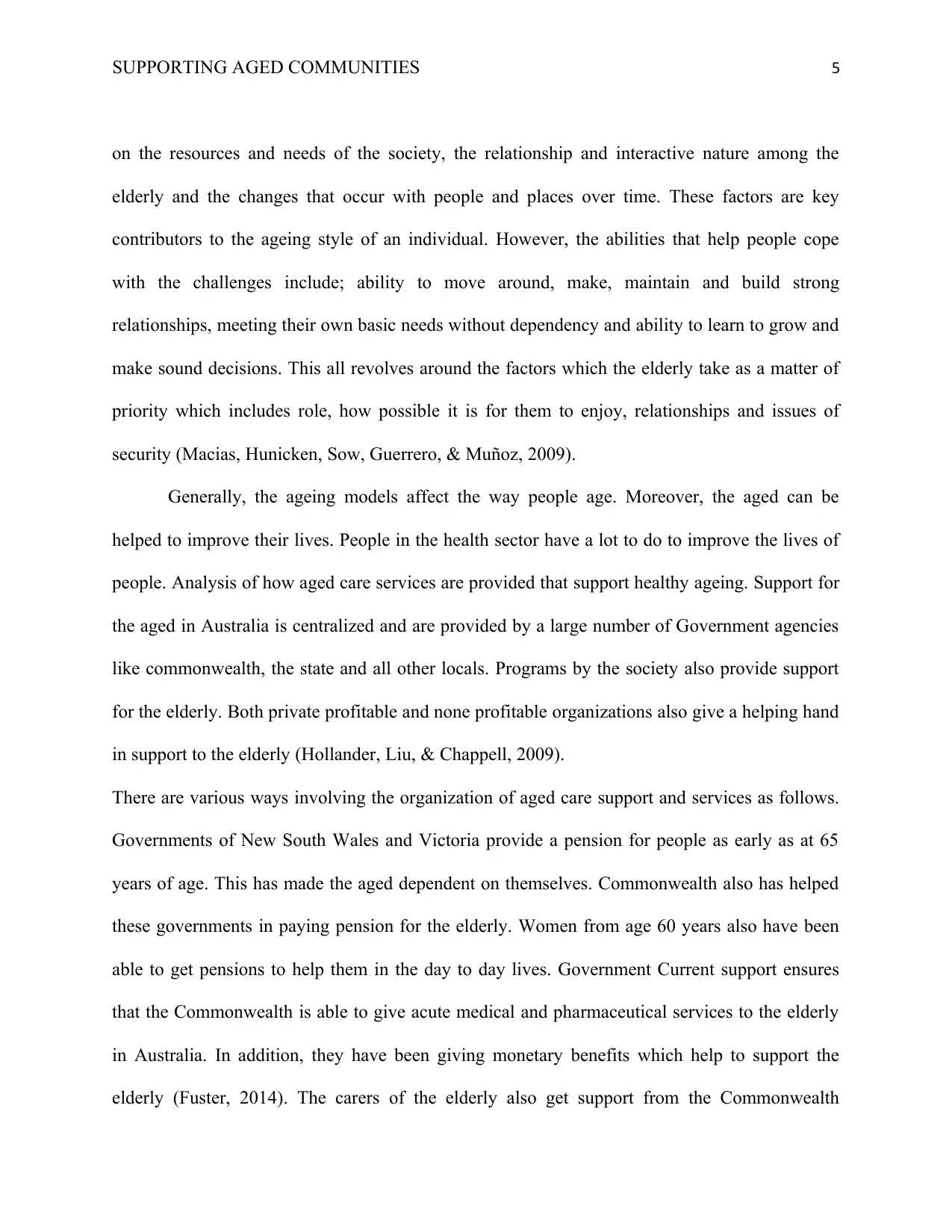
SUPPORTING AGED COMMUNITIES 5
on the resources and needs of the society, the relationship and interactive nature among the
elderly and the changes that occur with people and places over time. These factors are key
contributors to the ageing style of an individual. However, the abilities that help people cope
with the challenges include; ability to move around, make, maintain and build strong
relationships, meeting their own basic needs without dependency and ability to learn to grow and
make sound decisions. This all revolves around the factors which the elderly take as a matter of
priority which includes role, how possible it is for them to enjoy, relationships and issues of
security (Macias, Hunicken, Sow, Guerrero, & Muñoz, 2009).
Generally, the ageing models affect the way people age. Moreover, the aged can be
helped to improve their lives. People in the health sector have a lot to do to improve the lives of
people. Analysis of how aged care services are provided that support healthy ageing. Support for
the aged in Australia is centralized and are provided by a large number of Government agencies
like commonwealth, the state and all other locals. Programs by the society also provide support
for the elderly. Both private profitable and none profitable organizations also give a helping hand
in support to the elderly (Hollander, Liu, & Chappell, 2009).
There are various ways involving the organization of aged care support and services as follows.
Governments of New South Wales and Victoria provide a pension for people as early as at 65
years of age. This has made the aged dependent on themselves. Commonwealth also has helped
these governments in paying pension for the elderly. Women from age 60 years also have been
able to get pensions to help them in the day to day lives. Government Current support ensures
that the Commonwealth is able to give acute medical and pharmaceutical services to the elderly
in Australia. In addition, they have been giving monetary benefits which help to support the
elderly (Fuster, 2014). The carers of the elderly also get support from the Commonwealth
on the resources and needs of the society, the relationship and interactive nature among the
elderly and the changes that occur with people and places over time. These factors are key
contributors to the ageing style of an individual. However, the abilities that help people cope
with the challenges include; ability to move around, make, maintain and build strong
relationships, meeting their own basic needs without dependency and ability to learn to grow and
make sound decisions. This all revolves around the factors which the elderly take as a matter of
priority which includes role, how possible it is for them to enjoy, relationships and issues of
security (Macias, Hunicken, Sow, Guerrero, & Muñoz, 2009).
Generally, the ageing models affect the way people age. Moreover, the aged can be
helped to improve their lives. People in the health sector have a lot to do to improve the lives of
people. Analysis of how aged care services are provided that support healthy ageing. Support for
the aged in Australia is centralized and are provided by a large number of Government agencies
like commonwealth, the state and all other locals. Programs by the society also provide support
for the elderly. Both private profitable and none profitable organizations also give a helping hand
in support to the elderly (Hollander, Liu, & Chappell, 2009).
There are various ways involving the organization of aged care support and services as follows.
Governments of New South Wales and Victoria provide a pension for people as early as at 65
years of age. This has made the aged dependent on themselves. Commonwealth also has helped
these governments in paying pension for the elderly. Women from age 60 years also have been
able to get pensions to help them in the day to day lives. Government Current support ensures
that the Commonwealth is able to give acute medical and pharmaceutical services to the elderly
in Australia. In addition, they have been giving monetary benefits which help to support the
elderly (Fuster, 2014). The carers of the elderly also get support from the Commonwealth
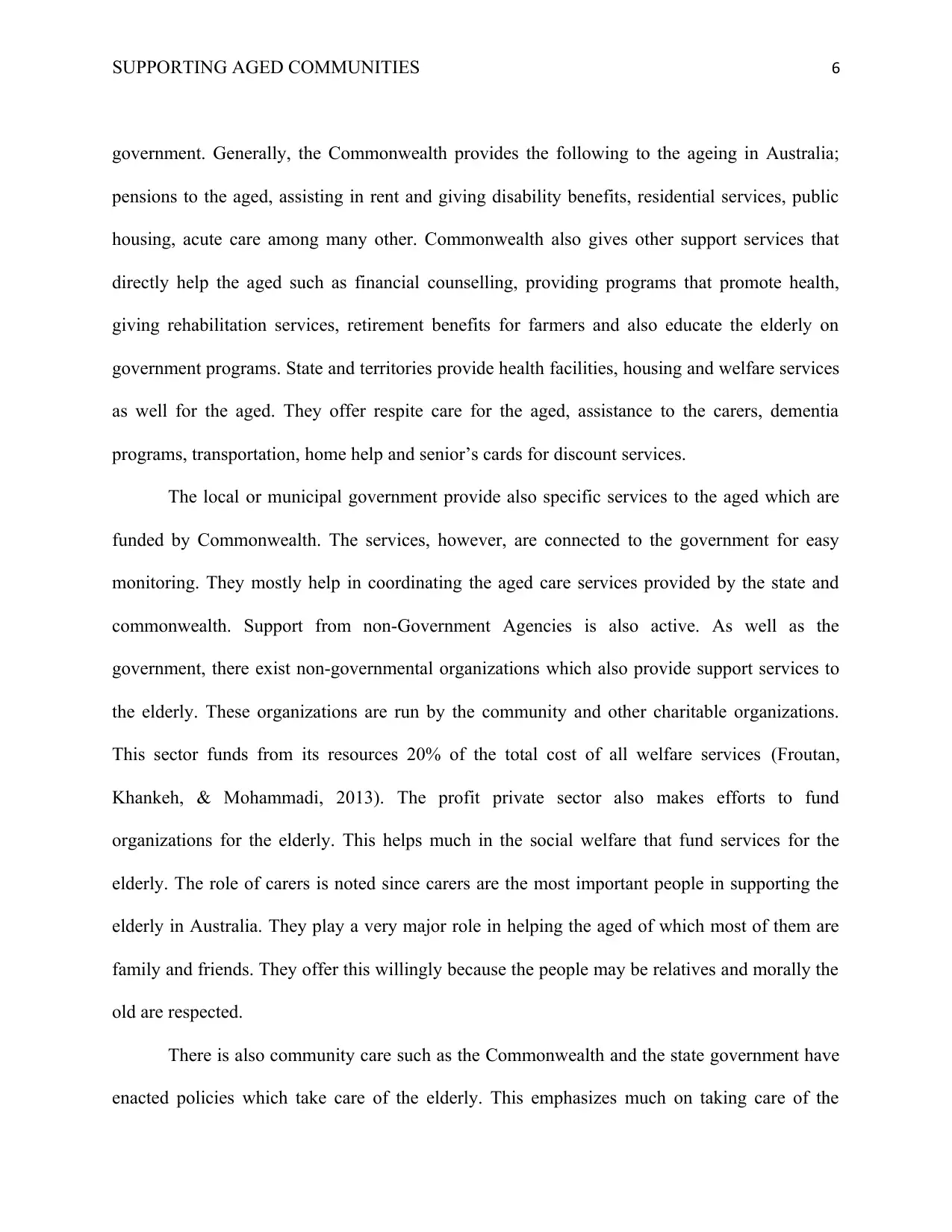
SUPPORTING AGED COMMUNITIES 6
government. Generally, the Commonwealth provides the following to the ageing in Australia;
pensions to the aged, assisting in rent and giving disability benefits, residential services, public
housing, acute care among many other. Commonwealth also gives other support services that
directly help the aged such as financial counselling, providing programs that promote health,
giving rehabilitation services, retirement benefits for farmers and also educate the elderly on
government programs. State and territories provide health facilities, housing and welfare services
as well for the aged. They offer respite care for the aged, assistance to the carers, dementia
programs, transportation, home help and senior’s cards for discount services.
The local or municipal government provide also specific services to the aged which are
funded by Commonwealth. The services, however, are connected to the government for easy
monitoring. They mostly help in coordinating the aged care services provided by the state and
commonwealth. Support from non-Government Agencies is also active. As well as the
government, there exist non-governmental organizations which also provide support services to
the elderly. These organizations are run by the community and other charitable organizations.
This sector funds from its resources 20% of the total cost of all welfare services (Froutan,
Khankeh, & Mohammadi, 2013). The profit private sector also makes efforts to fund
organizations for the elderly. This helps much in the social welfare that fund services for the
elderly. The role of carers is noted since carers are the most important people in supporting the
elderly in Australia. They play a very major role in helping the aged of which most of them are
family and friends. They offer this willingly because the people may be relatives and morally the
old are respected.
There is also community care such as the Commonwealth and the state government have
enacted policies which take care of the elderly. This emphasizes much on taking care of the
government. Generally, the Commonwealth provides the following to the ageing in Australia;
pensions to the aged, assisting in rent and giving disability benefits, residential services, public
housing, acute care among many other. Commonwealth also gives other support services that
directly help the aged such as financial counselling, providing programs that promote health,
giving rehabilitation services, retirement benefits for farmers and also educate the elderly on
government programs. State and territories provide health facilities, housing and welfare services
as well for the aged. They offer respite care for the aged, assistance to the carers, dementia
programs, transportation, home help and senior’s cards for discount services.
The local or municipal government provide also specific services to the aged which are
funded by Commonwealth. The services, however, are connected to the government for easy
monitoring. They mostly help in coordinating the aged care services provided by the state and
commonwealth. Support from non-Government Agencies is also active. As well as the
government, there exist non-governmental organizations which also provide support services to
the elderly. These organizations are run by the community and other charitable organizations.
This sector funds from its resources 20% of the total cost of all welfare services (Froutan,
Khankeh, & Mohammadi, 2013). The profit private sector also makes efforts to fund
organizations for the elderly. This helps much in the social welfare that fund services for the
elderly. The role of carers is noted since carers are the most important people in supporting the
elderly in Australia. They play a very major role in helping the aged of which most of them are
family and friends. They offer this willingly because the people may be relatives and morally the
old are respected.
There is also community care such as the Commonwealth and the state government have
enacted policies which take care of the elderly. This emphasizes much on taking care of the
⊘ This is a preview!⊘
Do you want full access?
Subscribe today to unlock all pages.

Trusted by 1+ million students worldwide
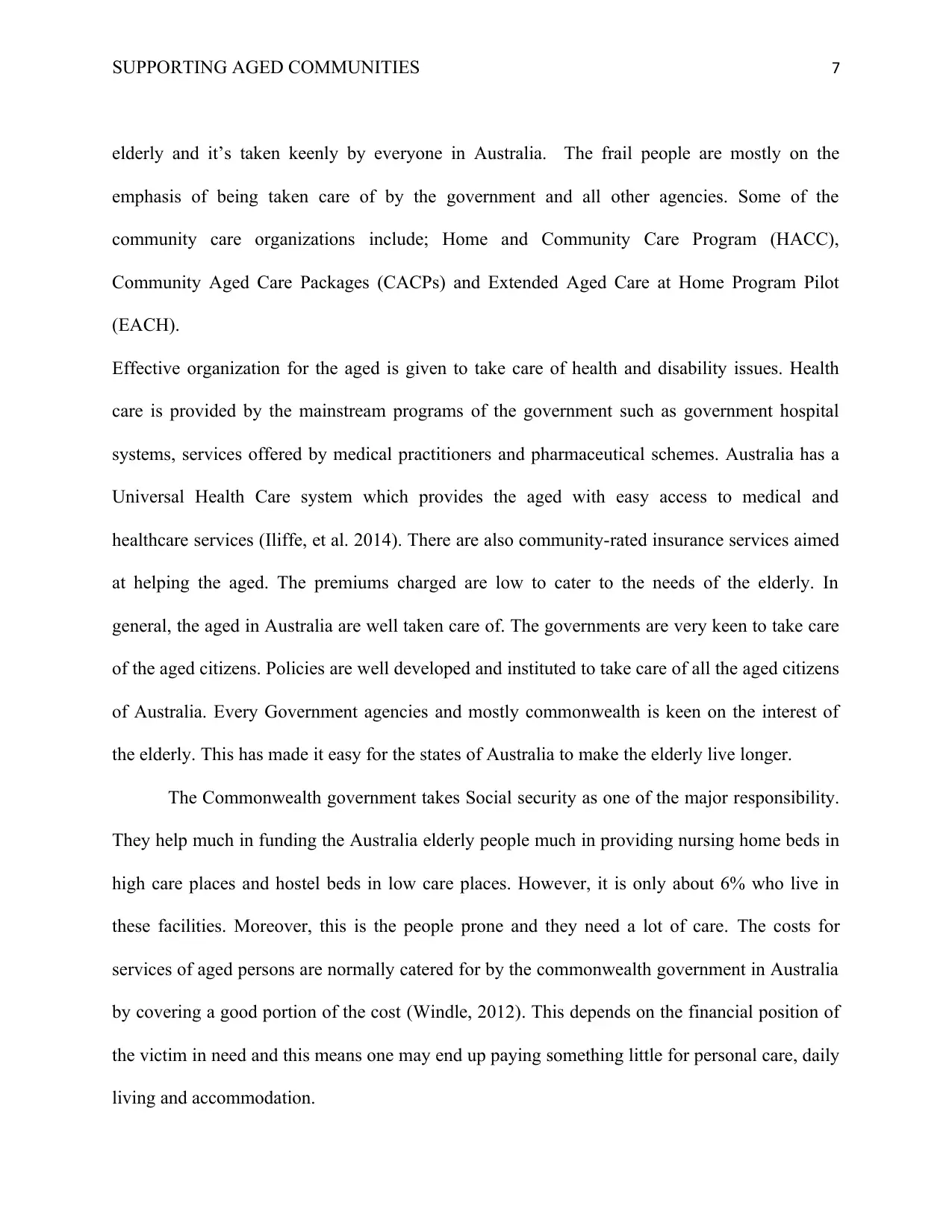
SUPPORTING AGED COMMUNITIES 7
elderly and it’s taken keenly by everyone in Australia. The frail people are mostly on the
emphasis of being taken care of by the government and all other agencies. Some of the
community care organizations include; Home and Community Care Program (HACC),
Community Aged Care Packages (CACPs) and Extended Aged Care at Home Program Pilot
(EACH).
Effective organization for the aged is given to take care of health and disability issues. Health
care is provided by the mainstream programs of the government such as government hospital
systems, services offered by medical practitioners and pharmaceutical schemes. Australia has a
Universal Health Care system which provides the aged with easy access to medical and
healthcare services (Iliffe, et al. 2014). There are also community-rated insurance services aimed
at helping the aged. The premiums charged are low to cater to the needs of the elderly. In
general, the aged in Australia are well taken care of. The governments are very keen to take care
of the aged citizens. Policies are well developed and instituted to take care of all the aged citizens
of Australia. Every Government agencies and mostly commonwealth is keen on the interest of
the elderly. This has made it easy for the states of Australia to make the elderly live longer.
The Commonwealth government takes Social security as one of the major responsibility.
They help much in funding the Australia elderly people much in providing nursing home beds in
high care places and hostel beds in low care places. However, it is only about 6% who live in
these facilities. Moreover, this is the people prone and they need a lot of care. The costs for
services of aged persons are normally catered for by the commonwealth government in Australia
by covering a good portion of the cost (Windle, 2012). This depends on the financial position of
the victim in need and this means one may end up paying something little for personal care, daily
living and accommodation.
elderly and it’s taken keenly by everyone in Australia. The frail people are mostly on the
emphasis of being taken care of by the government and all other agencies. Some of the
community care organizations include; Home and Community Care Program (HACC),
Community Aged Care Packages (CACPs) and Extended Aged Care at Home Program Pilot
(EACH).
Effective organization for the aged is given to take care of health and disability issues. Health
care is provided by the mainstream programs of the government such as government hospital
systems, services offered by medical practitioners and pharmaceutical schemes. Australia has a
Universal Health Care system which provides the aged with easy access to medical and
healthcare services (Iliffe, et al. 2014). There are also community-rated insurance services aimed
at helping the aged. The premiums charged are low to cater to the needs of the elderly. In
general, the aged in Australia are well taken care of. The governments are very keen to take care
of the aged citizens. Policies are well developed and instituted to take care of all the aged citizens
of Australia. Every Government agencies and mostly commonwealth is keen on the interest of
the elderly. This has made it easy for the states of Australia to make the elderly live longer.
The Commonwealth government takes Social security as one of the major responsibility.
They help much in funding the Australia elderly people much in providing nursing home beds in
high care places and hostel beds in low care places. However, it is only about 6% who live in
these facilities. Moreover, this is the people prone and they need a lot of care. The costs for
services of aged persons are normally catered for by the commonwealth government in Australia
by covering a good portion of the cost (Windle, 2012). This depends on the financial position of
the victim in need and this means one may end up paying something little for personal care, daily
living and accommodation.
Paraphrase This Document
Need a fresh take? Get an instant paraphrase of this document with our AI Paraphraser
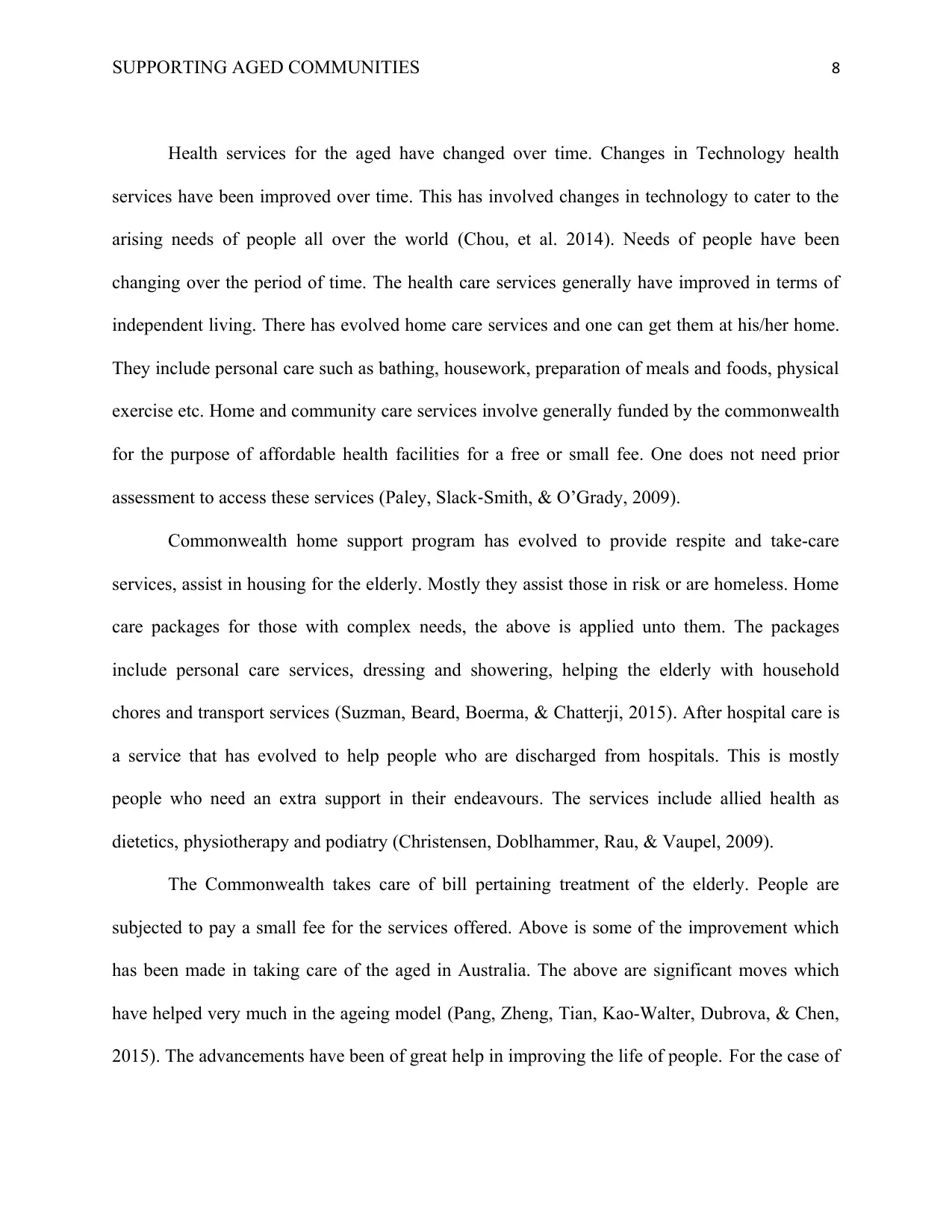
SUPPORTING AGED COMMUNITIES 8
Health services for the aged have changed over time. Changes in Technology health
services have been improved over time. This has involved changes in technology to cater to the
arising needs of people all over the world (Chou, et al. 2014). Needs of people have been
changing over the period of time. The health care services generally have improved in terms of
independent living. There has evolved home care services and one can get them at his/her home.
They include personal care such as bathing, housework, preparation of meals and foods, physical
exercise etc. Home and community care services involve generally funded by the commonwealth
for the purpose of affordable health facilities for a free or small fee. One does not need prior
assessment to access these services (Paley, Slack‐Smith, & O’Grady, 2009).
Commonwealth home support program has evolved to provide respite and take-care
services, assist in housing for the elderly. Mostly they assist those in risk or are homeless. Home
care packages for those with complex needs, the above is applied unto them. The packages
include personal care services, dressing and showering, helping the elderly with household
chores and transport services (Suzman, Beard, Boerma, & Chatterji, 2015). After hospital care is
a service that has evolved to help people who are discharged from hospitals. This is mostly
people who need an extra support in their endeavours. The services include allied health as
dietetics, physiotherapy and podiatry (Christensen, Doblhammer, Rau, & Vaupel, 2009).
The Commonwealth takes care of bill pertaining treatment of the elderly. People are
subjected to pay a small fee for the services offered. Above is some of the improvement which
has been made in taking care of the aged in Australia. The above are significant moves which
have helped very much in the ageing model (Pang, Zheng, Tian, Kao-Walter, Dubrova, & Chen,
2015). The advancements have been of great help in improving the life of people. For the case of
Health services for the aged have changed over time. Changes in Technology health
services have been improved over time. This has involved changes in technology to cater to the
arising needs of people all over the world (Chou, et al. 2014). Needs of people have been
changing over the period of time. The health care services generally have improved in terms of
independent living. There has evolved home care services and one can get them at his/her home.
They include personal care such as bathing, housework, preparation of meals and foods, physical
exercise etc. Home and community care services involve generally funded by the commonwealth
for the purpose of affordable health facilities for a free or small fee. One does not need prior
assessment to access these services (Paley, Slack‐Smith, & O’Grady, 2009).
Commonwealth home support program has evolved to provide respite and take-care
services, assist in housing for the elderly. Mostly they assist those in risk or are homeless. Home
care packages for those with complex needs, the above is applied unto them. The packages
include personal care services, dressing and showering, helping the elderly with household
chores and transport services (Suzman, Beard, Boerma, & Chatterji, 2015). After hospital care is
a service that has evolved to help people who are discharged from hospitals. This is mostly
people who need an extra support in their endeavours. The services include allied health as
dietetics, physiotherapy and podiatry (Christensen, Doblhammer, Rau, & Vaupel, 2009).
The Commonwealth takes care of bill pertaining treatment of the elderly. People are
subjected to pay a small fee for the services offered. Above is some of the improvement which
has been made in taking care of the aged in Australia. The above are significant moves which
have helped very much in the ageing model (Pang, Zheng, Tian, Kao-Walter, Dubrova, & Chen,
2015). The advancements have been of great help in improving the life of people. For the case of
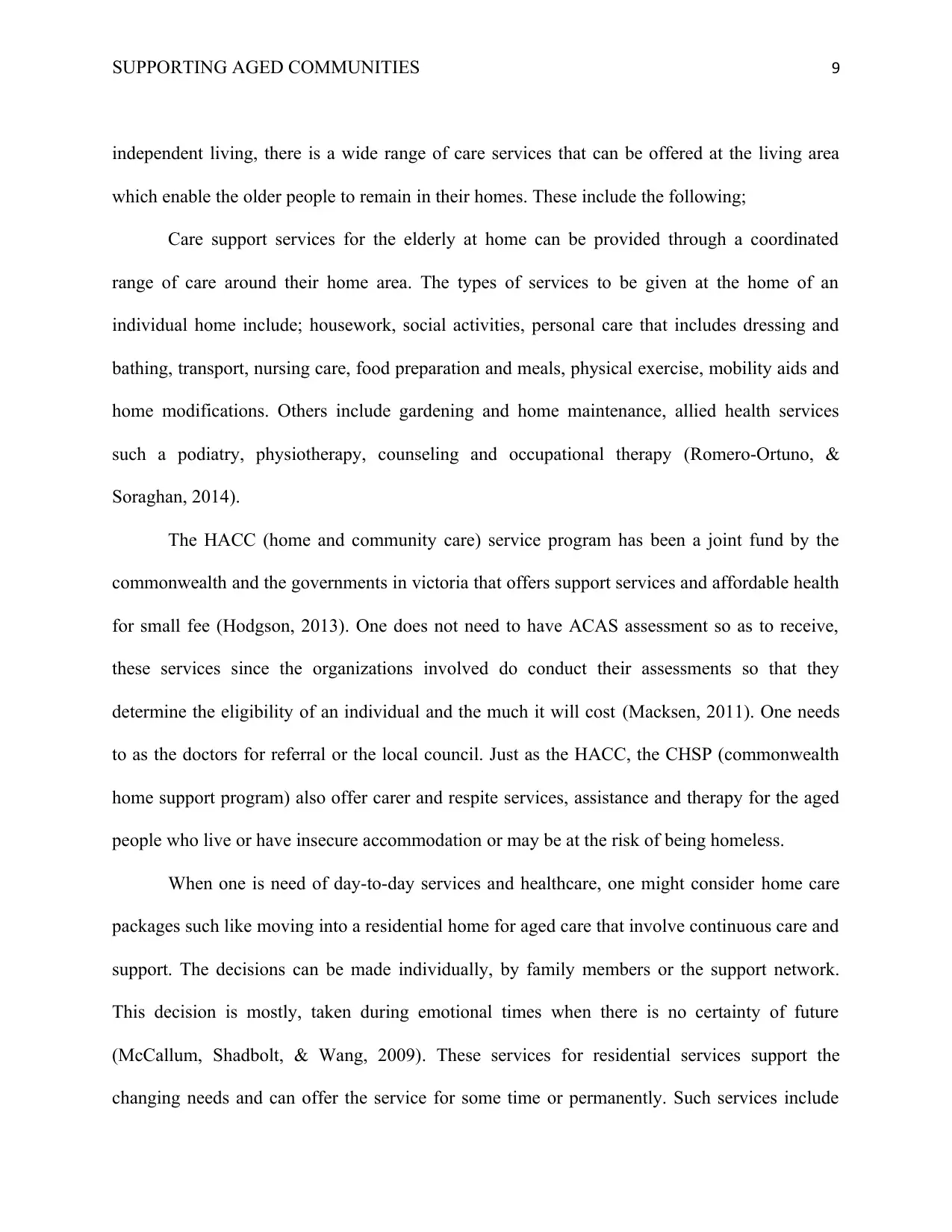
SUPPORTING AGED COMMUNITIES 9
independent living, there is a wide range of care services that can be offered at the living area
which enable the older people to remain in their homes. These include the following;
Care support services for the elderly at home can be provided through a coordinated
range of care around their home area. The types of services to be given at the home of an
individual home include; housework, social activities, personal care that includes dressing and
bathing, transport, nursing care, food preparation and meals, physical exercise, mobility aids and
home modifications. Others include gardening and home maintenance, allied health services
such a podiatry, physiotherapy, counseling and occupational therapy (Romero-Ortuno, &
Soraghan, 2014).
The HACC (home and community care) service program has been a joint fund by the
commonwealth and the governments in victoria that offers support services and affordable health
for small fee (Hodgson, 2013). One does not need to have ACAS assessment so as to receive,
these services since the organizations involved do conduct their assessments so that they
determine the eligibility of an individual and the much it will cost (Macksen, 2011). One needs
to as the doctors for referral or the local council. Just as the HACC, the CHSP (commonwealth
home support program) also offer carer and respite services, assistance and therapy for the aged
people who live or have insecure accommodation or may be at the risk of being homeless.
When one is need of day-to-day services and healthcare, one might consider home care
packages such like moving into a residential home for aged care that involve continuous care and
support. The decisions can be made individually, by family members or the support network.
This decision is mostly, taken during emotional times when there is no certainty of future
(McCallum, Shadbolt, & Wang, 2009). These services for residential services support the
changing needs and can offer the service for some time or permanently. Such services include
independent living, there is a wide range of care services that can be offered at the living area
which enable the older people to remain in their homes. These include the following;
Care support services for the elderly at home can be provided through a coordinated
range of care around their home area. The types of services to be given at the home of an
individual home include; housework, social activities, personal care that includes dressing and
bathing, transport, nursing care, food preparation and meals, physical exercise, mobility aids and
home modifications. Others include gardening and home maintenance, allied health services
such a podiatry, physiotherapy, counseling and occupational therapy (Romero-Ortuno, &
Soraghan, 2014).
The HACC (home and community care) service program has been a joint fund by the
commonwealth and the governments in victoria that offers support services and affordable health
for small fee (Hodgson, 2013). One does not need to have ACAS assessment so as to receive,
these services since the organizations involved do conduct their assessments so that they
determine the eligibility of an individual and the much it will cost (Macksen, 2011). One needs
to as the doctors for referral or the local council. Just as the HACC, the CHSP (commonwealth
home support program) also offer carer and respite services, assistance and therapy for the aged
people who live or have insecure accommodation or may be at the risk of being homeless.
When one is need of day-to-day services and healthcare, one might consider home care
packages such like moving into a residential home for aged care that involve continuous care and
support. The decisions can be made individually, by family members or the support network.
This decision is mostly, taken during emotional times when there is no certainty of future
(McCallum, Shadbolt, & Wang, 2009). These services for residential services support the
changing needs and can offer the service for some time or permanently. Such services include
⊘ This is a preview!⊘
Do you want full access?
Subscribe today to unlock all pages.

Trusted by 1+ million students worldwide
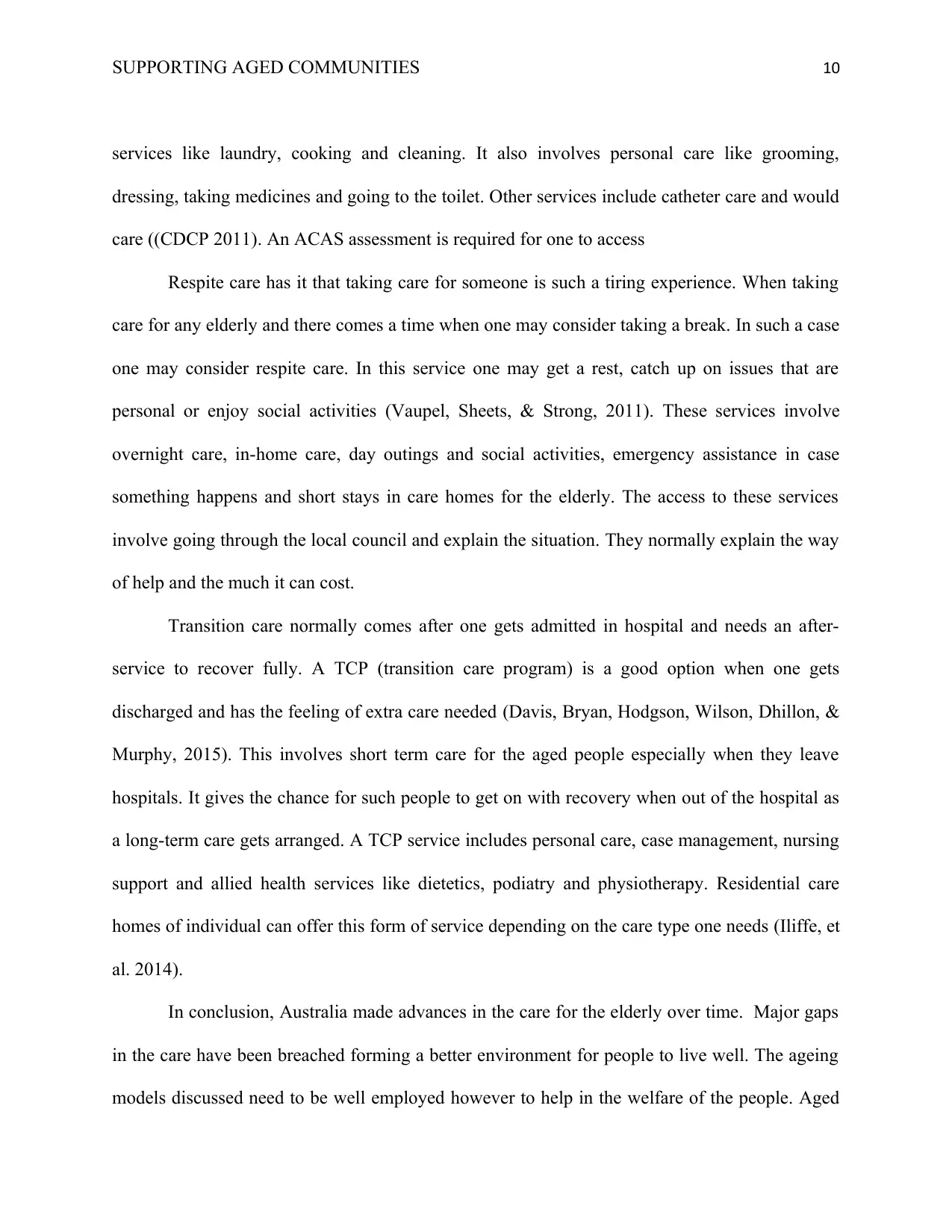
SUPPORTING AGED COMMUNITIES 10
services like laundry, cooking and cleaning. It also involves personal care like grooming,
dressing, taking medicines and going to the toilet. Other services include catheter care and would
care ((CDCP 2011). An ACAS assessment is required for one to access
Respite care has it that taking care for someone is such a tiring experience. When taking
care for any elderly and there comes a time when one may consider taking a break. In such a case
one may consider respite care. In this service one may get a rest, catch up on issues that are
personal or enjoy social activities (Vaupel, Sheets, & Strong, 2011). These services involve
overnight care, in-home care, day outings and social activities, emergency assistance in case
something happens and short stays in care homes for the elderly. The access to these services
involve going through the local council and explain the situation. They normally explain the way
of help and the much it can cost.
Transition care normally comes after one gets admitted in hospital and needs an after-
service to recover fully. A TCP (transition care program) is a good option when one gets
discharged and has the feeling of extra care needed (Davis, Bryan, Hodgson, Wilson, Dhillon, &
Murphy, 2015). This involves short term care for the aged people especially when they leave
hospitals. It gives the chance for such people to get on with recovery when out of the hospital as
a long-term care gets arranged. A TCP service includes personal care, case management, nursing
support and allied health services like dietetics, podiatry and physiotherapy. Residential care
homes of individual can offer this form of service depending on the care type one needs (Iliffe, et
al. 2014).
In conclusion, Australia made advances in the care for the elderly over time. Major gaps
in the care have been breached forming a better environment for people to live well. The ageing
models discussed need to be well employed however to help in the welfare of the people. Aged
services like laundry, cooking and cleaning. It also involves personal care like grooming,
dressing, taking medicines and going to the toilet. Other services include catheter care and would
care ((CDCP 2011). An ACAS assessment is required for one to access
Respite care has it that taking care for someone is such a tiring experience. When taking
care for any elderly and there comes a time when one may consider taking a break. In such a case
one may consider respite care. In this service one may get a rest, catch up on issues that are
personal or enjoy social activities (Vaupel, Sheets, & Strong, 2011). These services involve
overnight care, in-home care, day outings and social activities, emergency assistance in case
something happens and short stays in care homes for the elderly. The access to these services
involve going through the local council and explain the situation. They normally explain the way
of help and the much it can cost.
Transition care normally comes after one gets admitted in hospital and needs an after-
service to recover fully. A TCP (transition care program) is a good option when one gets
discharged and has the feeling of extra care needed (Davis, Bryan, Hodgson, Wilson, Dhillon, &
Murphy, 2015). This involves short term care for the aged people especially when they leave
hospitals. It gives the chance for such people to get on with recovery when out of the hospital as
a long-term care gets arranged. A TCP service includes personal care, case management, nursing
support and allied health services like dietetics, podiatry and physiotherapy. Residential care
homes of individual can offer this form of service depending on the care type one needs (Iliffe, et
al. 2014).
In conclusion, Australia made advances in the care for the elderly over time. Major gaps
in the care have been breached forming a better environment for people to live well. The ageing
models discussed need to be well employed however to help in the welfare of the people. Aged
Paraphrase This Document
Need a fresh take? Get an instant paraphrase of this document with our AI Paraphraser
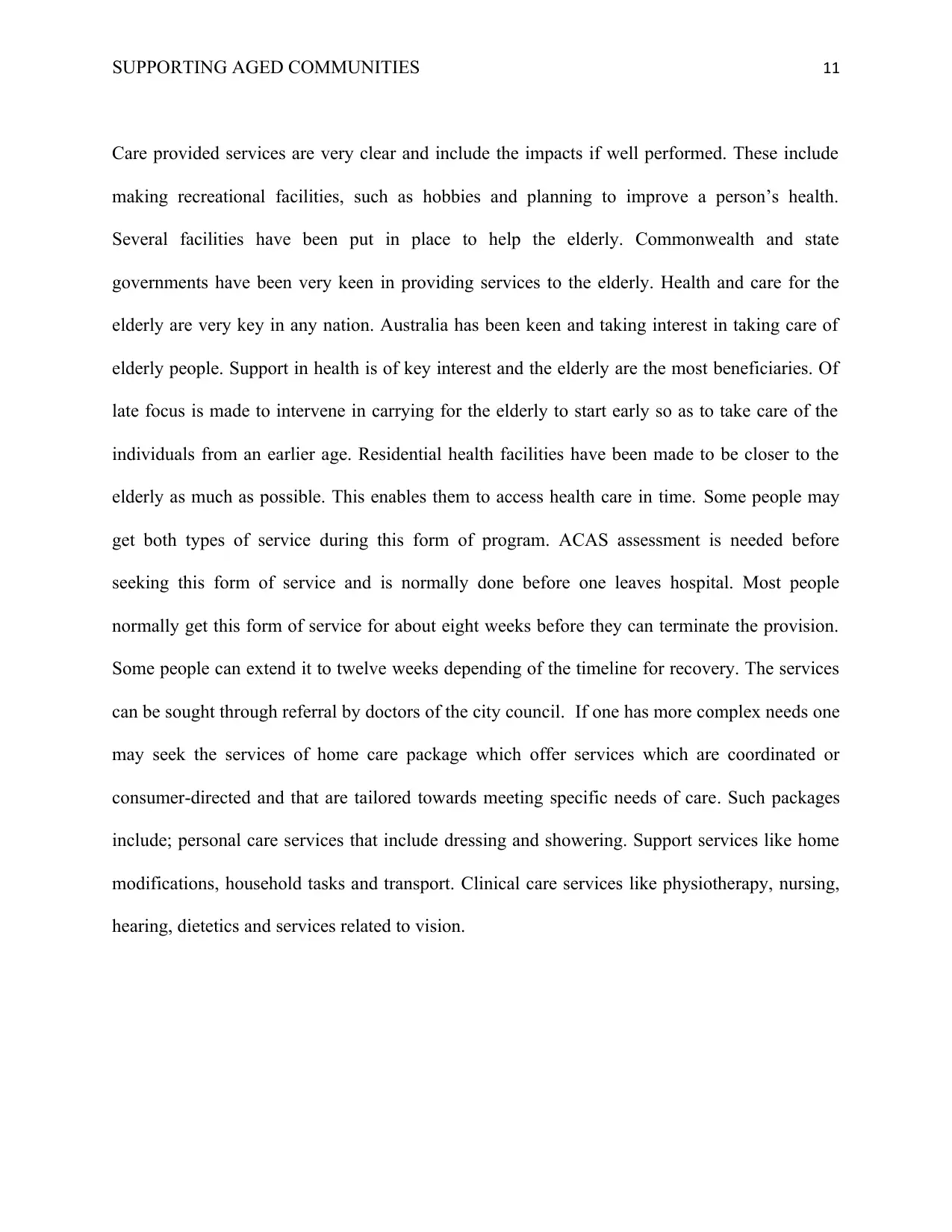
SUPPORTING AGED COMMUNITIES 11
Care provided services are very clear and include the impacts if well performed. These include
making recreational facilities, such as hobbies and planning to improve a person’s health.
Several facilities have been put in place to help the elderly. Commonwealth and state
governments have been very keen in providing services to the elderly. Health and care for the
elderly are very key in any nation. Australia has been keen and taking interest in taking care of
elderly people. Support in health is of key interest and the elderly are the most beneficiaries. Of
late focus is made to intervene in carrying for the elderly to start early so as to take care of the
individuals from an earlier age. Residential health facilities have been made to be closer to the
elderly as much as possible. This enables them to access health care in time. Some people may
get both types of service during this form of program. ACAS assessment is needed before
seeking this form of service and is normally done before one leaves hospital. Most people
normally get this form of service for about eight weeks before they can terminate the provision.
Some people can extend it to twelve weeks depending of the timeline for recovery. The services
can be sought through referral by doctors of the city council. If one has more complex needs one
may seek the services of home care package which offer services which are coordinated or
consumer-directed and that are tailored towards meeting specific needs of care. Such packages
include; personal care services that include dressing and showering. Support services like home
modifications, household tasks and transport. Clinical care services like physiotherapy, nursing,
hearing, dietetics and services related to vision.
Care provided services are very clear and include the impacts if well performed. These include
making recreational facilities, such as hobbies and planning to improve a person’s health.
Several facilities have been put in place to help the elderly. Commonwealth and state
governments have been very keen in providing services to the elderly. Health and care for the
elderly are very key in any nation. Australia has been keen and taking interest in taking care of
elderly people. Support in health is of key interest and the elderly are the most beneficiaries. Of
late focus is made to intervene in carrying for the elderly to start early so as to take care of the
individuals from an earlier age. Residential health facilities have been made to be closer to the
elderly as much as possible. This enables them to access health care in time. Some people may
get both types of service during this form of program. ACAS assessment is needed before
seeking this form of service and is normally done before one leaves hospital. Most people
normally get this form of service for about eight weeks before they can terminate the provision.
Some people can extend it to twelve weeks depending of the timeline for recovery. The services
can be sought through referral by doctors of the city council. If one has more complex needs one
may seek the services of home care package which offer services which are coordinated or
consumer-directed and that are tailored towards meeting specific needs of care. Such packages
include; personal care services that include dressing and showering. Support services like home
modifications, household tasks and transport. Clinical care services like physiotherapy, nursing,
hearing, dietetics and services related to vision.
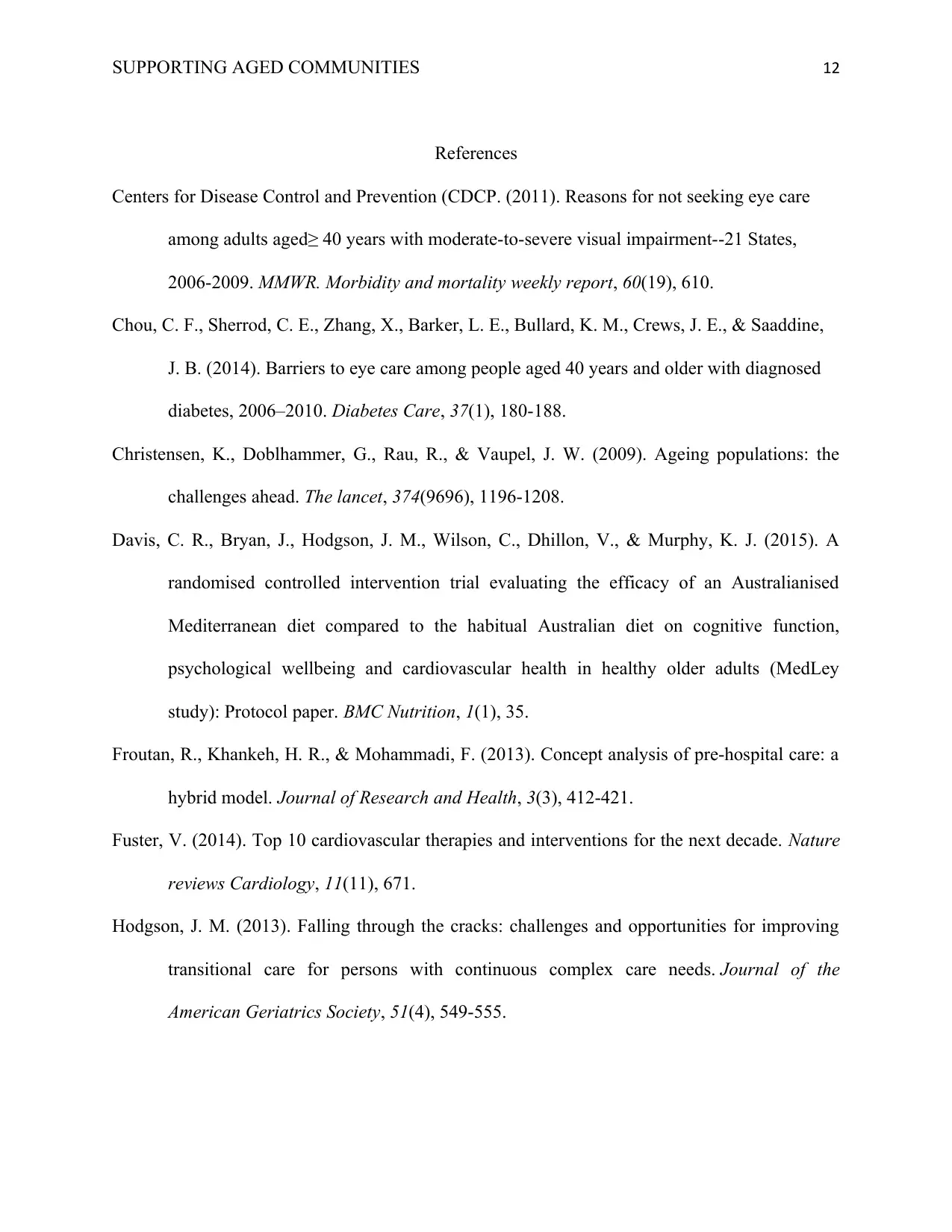
SUPPORTING AGED COMMUNITIES 12
References
Centers for Disease Control and Prevention (CDCP. (2011). Reasons for not seeking eye care
among adults aged≥ 40 years with moderate-to-severe visual impairment--21 States,
2006-2009. MMWR. Morbidity and mortality weekly report, 60(19), 610.
Chou, C. F., Sherrod, C. E., Zhang, X., Barker, L. E., Bullard, K. M., Crews, J. E., & Saaddine,
J. B. (2014). Barriers to eye care among people aged 40 years and older with diagnosed
diabetes, 2006–2010. Diabetes Care, 37(1), 180-188.
Christensen, K., Doblhammer, G., Rau, R., & Vaupel, J. W. (2009). Ageing populations: the
challenges ahead. The lancet, 374(9696), 1196-1208.
Davis, C. R., Bryan, J., Hodgson, J. M., Wilson, C., Dhillon, V., & Murphy, K. J. (2015). A
randomised controlled intervention trial evaluating the efficacy of an Australianised
Mediterranean diet compared to the habitual Australian diet on cognitive function,
psychological wellbeing and cardiovascular health in healthy older adults (MedLey
study): Protocol paper. BMC Nutrition, 1(1), 35.
Froutan, R., Khankeh, H. R., & Mohammadi, F. (2013). Concept analysis of pre-hospital care: a
hybrid model. Journal of Research and Health, 3(3), 412-421.
Fuster, V. (2014). Top 10 cardiovascular therapies and interventions for the next decade. Nature
reviews Cardiology, 11(11), 671.
Hodgson, J. M. (2013). Falling through the cracks: challenges and opportunities for improving
transitional care for persons with continuous complex care needs. Journal of the
American Geriatrics Society, 51(4), 549-555.
References
Centers for Disease Control and Prevention (CDCP. (2011). Reasons for not seeking eye care
among adults aged≥ 40 years with moderate-to-severe visual impairment--21 States,
2006-2009. MMWR. Morbidity and mortality weekly report, 60(19), 610.
Chou, C. F., Sherrod, C. E., Zhang, X., Barker, L. E., Bullard, K. M., Crews, J. E., & Saaddine,
J. B. (2014). Barriers to eye care among people aged 40 years and older with diagnosed
diabetes, 2006–2010. Diabetes Care, 37(1), 180-188.
Christensen, K., Doblhammer, G., Rau, R., & Vaupel, J. W. (2009). Ageing populations: the
challenges ahead. The lancet, 374(9696), 1196-1208.
Davis, C. R., Bryan, J., Hodgson, J. M., Wilson, C., Dhillon, V., & Murphy, K. J. (2015). A
randomised controlled intervention trial evaluating the efficacy of an Australianised
Mediterranean diet compared to the habitual Australian diet on cognitive function,
psychological wellbeing and cardiovascular health in healthy older adults (MedLey
study): Protocol paper. BMC Nutrition, 1(1), 35.
Froutan, R., Khankeh, H. R., & Mohammadi, F. (2013). Concept analysis of pre-hospital care: a
hybrid model. Journal of Research and Health, 3(3), 412-421.
Fuster, V. (2014). Top 10 cardiovascular therapies and interventions for the next decade. Nature
reviews Cardiology, 11(11), 671.
Hodgson, J. M. (2013). Falling through the cracks: challenges and opportunities for improving
transitional care for persons with continuous complex care needs. Journal of the
American Geriatrics Society, 51(4), 549-555.
⊘ This is a preview!⊘
Do you want full access?
Subscribe today to unlock all pages.

Trusted by 1+ million students worldwide
1 out of 15
Related Documents
Your All-in-One AI-Powered Toolkit for Academic Success.
+13062052269
info@desklib.com
Available 24*7 on WhatsApp / Email
![[object Object]](/_next/static/media/star-bottom.7253800d.svg)
Unlock your academic potential
Copyright © 2020–2026 A2Z Services. All Rights Reserved. Developed and managed by ZUCOL.




